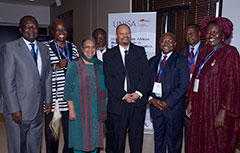Cognitive justice and the African and global commons - UNISA Retreat
Cognitive justice and the African and global commons was the theme for the 5th Department of Science and Technology (DST)/National Research Foundation (NRF), South African Research Chair in Development Education retreat at Unisa from 24 to 30 November 2012.
 With a resounding African start gathering key speakers from various disciplines, the retreat calls that, amongst others, education and its link with development to be revisited. In her opening address, Professor Catherine Odora Hoppers, incumbent of the DST/NRF SARChI Chair said, “What we need to share, echo, assert and implement are deep visions of education capable of interrogating development, rather than being its drowsy bed-fellow”.
With a resounding African start gathering key speakers from various disciplines, the retreat calls that, amongst others, education and its link with development to be revisited. In her opening address, Professor Catherine Odora Hoppers, incumbent of the DST/NRF SARChI Chair said, “What we need to share, echo, assert and implement are deep visions of education capable of interrogating development, rather than being its drowsy bed-fellow”.
Excited by what this retreat promises, Professor Mandla Makhanya, Principal and Vice-Chancellor, fully supports the initiative, more so as Unisa finds itself at a very interesting juncture in its strategic development. “The Chair’s thinking about knowledge, learning, innovation, social justice and human agency within the context of a knowledge economy and information society resonates strongly with the university’s objectives.”
Before the days of deep conversation ahead, a dinner gala was be held on 26 November 2012 with representation from the Thabo Mbeki Foundation and a keynote address by the Honourable Professor Shepherd Mayatula, Chairperson of the Portfolio Committee on Education and Training.
Committing to a marriage of indigenous and modern knowledge
It was fitting that Sotho South African singer-songwriter Vusi Mahlasela crooned out his song Silang mabele at the special gala dinner in honour of the 5th Department of Science and Technology (DST)/National Research Foundation (NRF), South African Research Chair in Development Education retreat on 26 November. Translated as crushing corn, it’s a traditional folk song about getting down to work and, on another level, a call to fight poverty all over the world. Not just poverty in its raw sense, but perhaps poverty of the mind too.
It’s clear that the time to roll up our sleeves and focus on knowledge production and human development is here. And whilst the wheels turn for this strategic value of the SARChI Chair, poverty of the mind that lacks understanding of indigenous knowledge systems (IKS) will see a shift too.
Speaking at the dinner, Professor Shepherd Mayatula, Chairperson of the Portfolio Committee on Education and Training said, “We are called upon not to look down on our indigenous people who are still practising the role of being custodians of our culture. We are called upon to respect and acknowledge them as experts in their field. This is the time for us to put on new spectacles and commit to a marriage of indigenous and modern knowledge.”
With IKS contributing to advancement of knowledge and innovation, Prof. Catherine Odora Hoppers (incumbent of the DST/NRF SARChI Chair) is calling on the need for new thinking in curriculum, research and community engagement. (See picture gallery below for more.)
Mayatula is delighted by the presence of IKS practitioners at the retreat and how theory is being unpacked and spelt out. He believes that the values of ubuntu will carry the conversations to where it should be. “Do not do anything for yourself, do it for others. And this is what an African home lives by through the simplest of things, such as preparing meals. You don’t say there are five of us and then you count how much to prepare. No. You always expect somebody to come and you serve,” he said.
Fully supporting this initiative and its underlying theme, Cognitive justice and the African and global commons, Professor Narend Baijnath, Pro-Vice-Chancellor, said “This underlines our university’s commitment to building on our collective legacy, to celebrate and preserve our indigenous knowledge heritage, and, participate in, and contribute to, the global and African commons.”
The goals of SARChI as inscripted into its mandate have been to advance the frontiers of knowledge through focused research in identified fields or problem areas, and create new research career pathways for highly skilled, high quality young and mid-career researchers, as well as stimulate strategic research across the knowledge spectrum.
The task for researchers is not an easy one as the interface between research and development is caught in between those who want IKS as a commodity and those who value IKS as a way of life plus a commodity. At the core of the development of IKS lies the challenge of bringing South African citizens, who are the masses in this country, into the innovation systems in the 21st century without casting them aside just because they cannot read and write, cannot decipher the codes in the scientific frame, or are just not western enough.
 Printer-friendly version
Printer-friendly version- Login to post comments
- 125 reads






Comments
Return from the retreat